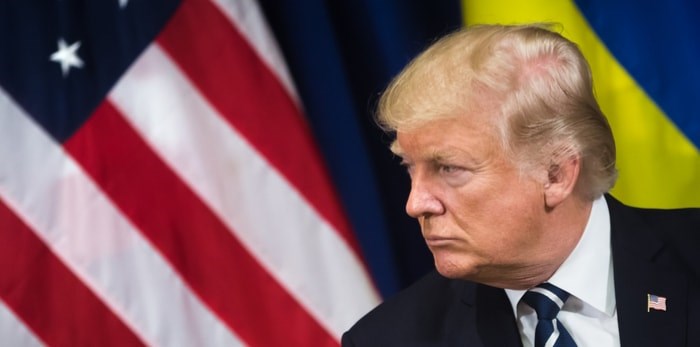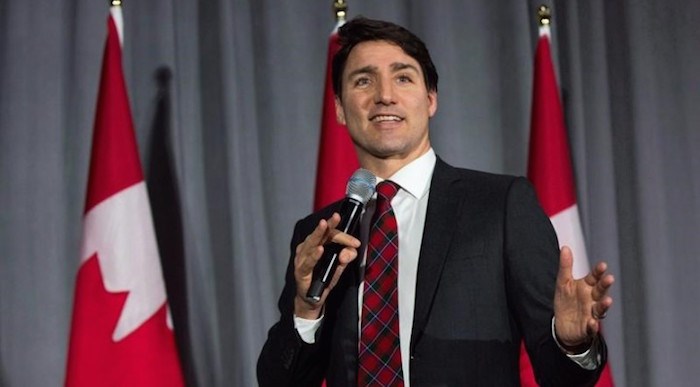Whether we enjoy it or not, Canada has already been subjected to the early stages of the 2020 United States presidential campaign. If a different person were occupying the Oval Office, the attention paid to this political process would probably be minor. But with just over 500 days before Americans figure out whether to keep Donald Trump, there is little escape from press conferences, statements and tweets.
More than 20 Democratic party hopefuls are already exploring their chances, and media coverage on both sides of the 49th parallel has continued to focus on Trump. In a time of increased connectivity, more Canadians are paying attention to American politics than ever before.
 Donald Trump (Drop of Light / Shutterstock.com)
Donald Trump (Drop of Light / Shutterstock.com)
In spite of Canadian Prime Minister Justin Trudeau being parodied recently in episodes of Family Guy (very positively) and The Simpsons (not too positively), Americans are not as exposed to Canadian news and information. In contrast, American events that would have merited scant attention from Canadians in years past – such as the nomination of a Supreme Court justice – were the top stories on nightly newscasts and radio shows.
With this intense coverage in mind, Research Co. asked Canadians about their perceptions on what the current dweller of the White House has accomplished, whether his election has been beneficial to Canada and who – if anyone – is better equipped to handle him in the name of our country after the federal election that will take place later this year.
Just under half of Canadians (46%) say that Trump has performed “about the same” as they expected, while two in five (40%) say he has been “worse” than they originally envisioned. Fewer than one in 10 Canadians (8%) think the 45th president has exceeded expectations – including 18% of Albertans and 20% of adults who voted for the Conservative Party of Canada in the 2015 federal election.
Only 10% of Canadians think Trump has “accomplished much” since he became president, while more than a third (37%) say he has done “little” and 39% give him the benefit of the doubt, saying it is too early to judge what he has achieved. Once again, Trump fares better in Alberta (21%) and among the Tory faithful (27%).
When asked if having Trump as president of the United States has been good or bad for Canada, most residents are downtrodden. Almost two-thirds of Canadians (65%) think a Trump White House has been “very bad” or “bad” for Canada, a proportion that reaches 73% in British Columbia, 71% in Quebec, 69% among those aged 55 and over and 68% among women.
For two groups – once again – views on Trump’s effect on Canada are not as negative. Almost a third of Albertans (32%) and Conservative voters (30%) believe that Trump has been “very good” or “good” for Canada.
When Republicans John McCain and Mitt Romney ran against Democratic nominee Barack Obama in 2008 and 2012, they also were regarded in a more positive light by Albertans and Conservative voters. To witness a similar reaction to Trump is not surprising, but there is a key difference: the level of animosity towards Trump from most Canadians is demonstrably superior to the restrained satisfaction they voiced when Obama was in the White House.
Trump’s victory in 2016 may have caught the Canadian federal government by surprise. This time around, they have dealt with him in negotiations and discussions. It seems this experience is making the current prime minister a more attractive choice when Canadians ponder the future of bilateral relations.
 Justin Trudeau (The Canadian Press)
Justin Trudeau (The Canadian Press)
When Canadians are asked which one of the two main federal party leaders would fare better trying to deal with Trump, Trudeau leads Opposition Leader Andrew Scheer by a 2-1 margin (35% to 17%). With a few months to go before the federal ballot, almost half of Canadians say neither man is suited to manage Trump (29%) or are undecided (19%).
Trudeau holds a sizeable advantage on this question among all demographics except, predictably, Albertans and Conservative voters. However, it is the size of his lead in three provinces that could play a crucial role in reconnecting with voters: 40% of Quebecers, 35% of British Columbians and 33% of Ontarians would prefer to have Trudeau handling Trump.
Given these numbers, it would not be out of the ordinary to see a Liberal Party of Canada ad campaign on who should take a phone call from Trump at 24 Sussex. After all, the effort to tie Scheer with Ontario Premier Doug Ford has already begun.
Results are based on an online study conducted from May 31 to June 3, 2019, among 1,000 adults in Canada. The data has been statistically weighted according to Canadian census figures for age, gender and region in Canada. The margin of error – which measures sample variability – is plus or minus 3.1 percentage points, 19 times out of 20.


